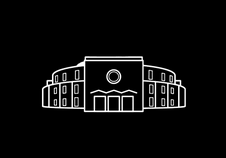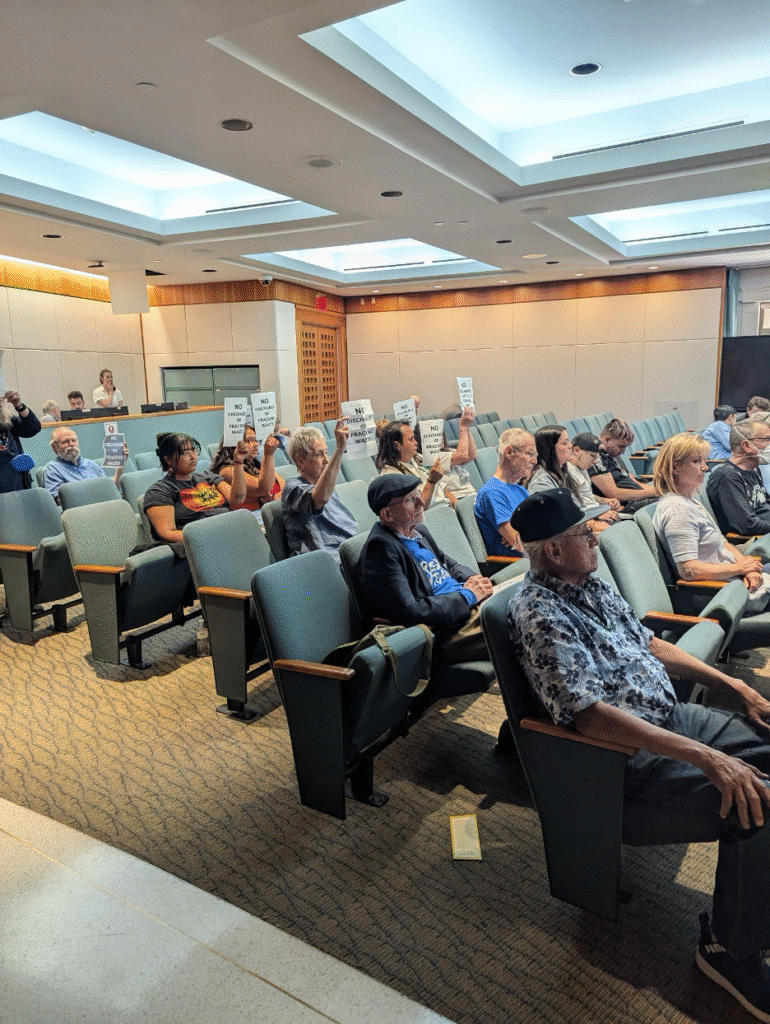WQCC Reverses Decision To Allow Use of Fracking Wastewater Without Permitting



Environmental Protection Advocates Gather at Roundhouse and Attend Water Quality Control Commission Meeting to Demonstrate Opposition to Allowing Discharge of Oil and Gas Fracking Wastewater
Strong letter from Legislators, Intervention of Advocacy Groups and Public Pressure Opposing Discharge of Oil and Gas Wastewater Impacted Commission Reversing Its Original Course
Organizations Press Release – Statement From the Defend NM Water members New Energy Economy, Youth United for Climate Crisis Action, Indivisible Albuquerque, WildEarth Guardians, and the Center for Biological Diversity
May 13th, 2025 – Santa Fe, NM – Today the Water Quality Control Commission reversed previous decisions regarding the discharge of oil and gas industry waste called produced water, after legislators, environmental advocates and Indigenous community members objected to decisions the Commission made at its April meeting.
The Commission voted that they would not allow any discharge to groundwater from pilot projects, reversing their April decision to allow discharge permits for pilot projects. They also decided to require a permit process for pilot projects that are determined by NMED to be no-discharge projects, but plan to vote on the specific language of that permit procedure after language defining those permits is drafted by the Hearing Officer.
During the April meeting the Commissioners voted to allow discharge of 2000 barrels per day of treated oil and gas fracking waste from pilot projects to groundwater, to apply a flimsy and illegal Notice of Intent procedure for pilot projects that don’t anticipate discharge, and ignored issues of jurisdiction and significant potential harms from the toxic residual waste that treatment processes create.
The Commission announced its intention to include these decisions in final language and vote on adoption of the rule at their May 13th meeting, but environmental advocates filed three motions in the interim (attached) to alert the Commission that their April decisions violate the Water Quality Act and the Produced Water Act, and failed to grapple with the Hazardous Waste Act which must apply to any hazardous residual waste.
Twenty-seven New Mexico state legislators also wrote to the Commission to warn that discharge must not be allowed until scientifically based treatment standards are developed to protect our water and our health from irreversible harm.
We commend the WQCC for listening to the science, for listening to the people and for protecting our precious water. We also commend the hundreds of people who wrote to the Commission, who showed up to make public comment in May and August, and who showed up in force today to show the Commission that the people of New Mexico do not want to allow the oil and gas industry to use our land, our water and our bodies as a dumping ground for the oceans of toxic, radioactive fracking waste that they continue to produce.
Mariel Nanasi, Executive Director of New Energy Economy commented after the meeting, “Today science and truth prevailed. Without knowing what needs to be removed from produced water, it is impossible to develop treatment standards or assure the public that discharges will be safe. You can’t regulate or remove what you can’t identify. The notion that we could proceed to permit discharges under these circumstances is not only scientifically unsound—it is reckless. We are grateful to all the water protectors who joined us in opposing the oil and gas industry’s push to dump their waste on New Mexico.”
Sandy Stulberg from Indivisible Albuquerque stated, “Today the Water Quality Control Commission was set to finalize a reuse rule that would allow 2,000 barrels of fracking waste to be discharged to groundwater. We are thankful to the WQCC for reconsidering that decision and changing course. We are also grateful to all the citizen activists across the state that called, wrote, emailed, gave public comment and testimony and showed up at hearings. They voiced their concerns to the WQCC that we must have treatment processes and scientific research to establish safe standards for treatment and quality before discharge can be allowed. Civic engagement works.”
Said Ennedith Lopez of the group Youth United for Climate Crisis Action (YUCCA) offered the following statement, “Agua es Vida and the results of today’s ruling are a testament to the power of the people and our movement. As YUCCA continues to stand in firm opposition to any reuse of produced water without scientific consensus, we’re proud that continued pressure from our movement forced the Water Quality Control Commission to act – establishing critical guardrails that will help to protect New Mexicans from this reckless attempt to dump the oil and gas industry’s toxic waste problem onto our communities.”
“Thankfully, the oil and gas industry lost its reckless bid to dump toxic waste onto our crops and into our rivers, at least for now,” said Colin Cox of the Center for Biological Diversity. “But they will keep trying to make their waste our problem.”
“We’re glad the Commission revoked its decision to allow discharge permits for pilot projects,” said Melissa Troutman of WildEarth Guardians. “But the fact that pilot projects are allowed off the oilfield at all is still rife with risk. Industry is spilling toxic material every 7 hours on average in the oilfield already, and this rule allows toxic waste to come off the oilfield, creating even more pathways for spills to pollute water and land. The most common material spilled is produced water, which is hazardous waste even though it’s exempt from hazardous waste law. The only thing hazardous waste should be used for is hazardous waste disposal – not experiments aimed toward discharge to rivers and irrigation for crops.”